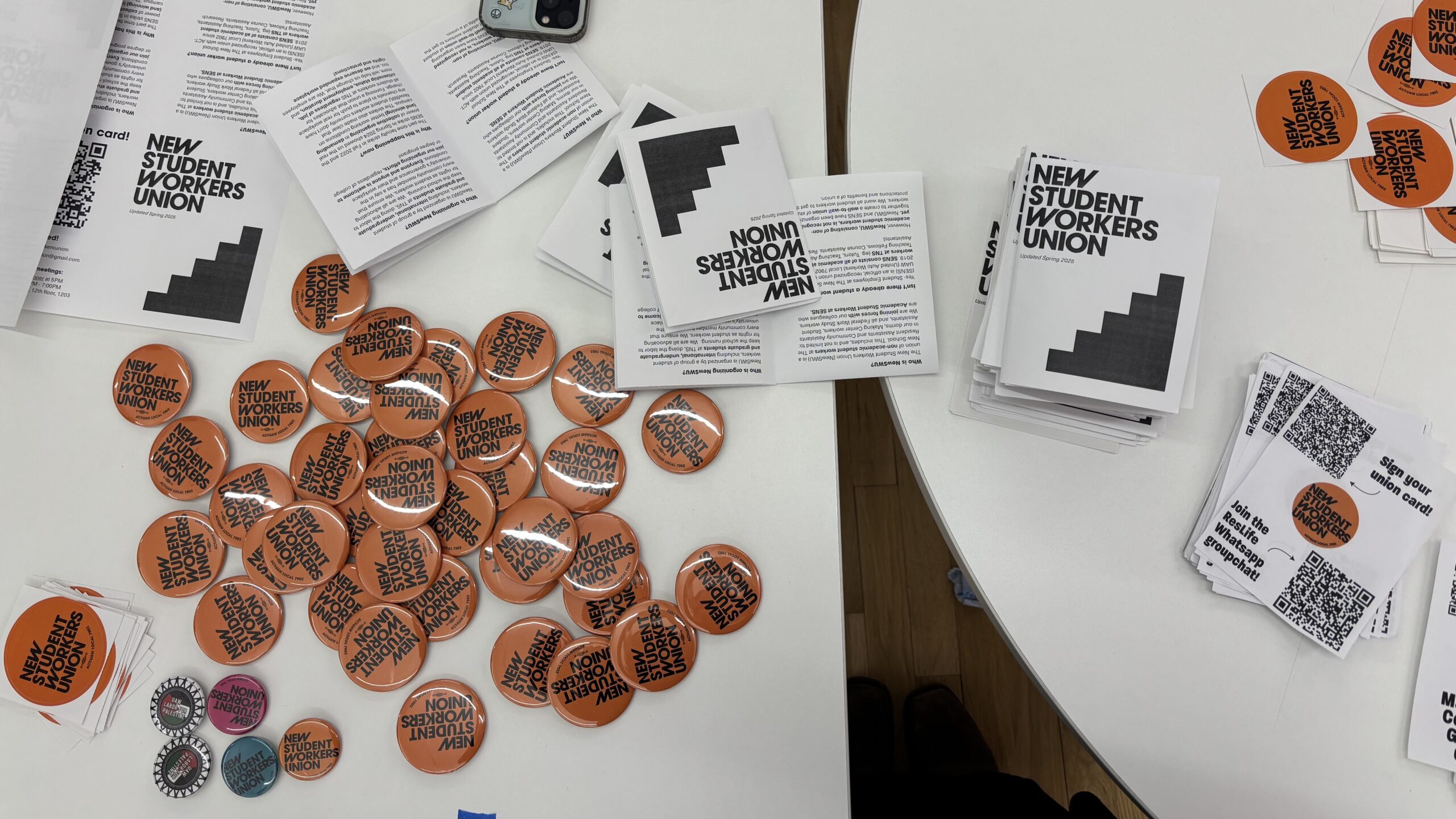The New Student Workers Union (NewSWU) withdrew their petition seeking a union election from consideration by the National Labor Relations Board (NLRB). The original petition asked for an accretion election to join Student Employees at The New School (SENS-UAW).
Last month, student workers announced their decision to withdraw during a town hall dinner on the one-year anniversary of the SENS-UAW strike. Non-academic student workers have organized rallies for recognition since then but still haven’t been recognized as a union by the university.
“We’ve been fighting to get recognized by the school for years. Despite that, we’ve been able to provide support to a lot of workers who are struggling with weird workplace situations,” NewSWU organizing committee member Jonah Devlin said. Devlin is also an equipment manager in the contemporary music department and a fourth-year student at Eugene Lang College of Liberal Arts.
NewSWU first filed its NLRB petition on Aug. 7, 2023, in an effort to join SENS, the union that has represented academic student workers at TNS. SENS is also under the umbrella of ACT-UAW Local 7902, which covers part-time faculty and student health employees at the university. The unionization of NewSWU has been discussed since the formation of SENS in 2017.
NewSWU’s formal recognition as a union has been held up by TNS’s claim that non-academic student workers are not legally allowed to hold the union election they filed for. This is because they are not employees under the common-law test used by several U.S. government agencies to determine whether an individual fits the criteria of an employee.
A Statement of Position filed by The New School on Aug. 21, 2023 in response to NewSWU’s NLRB petition reads, “The instant petition should be dismissed insofar as the individuals holding positions in the job classifications alleged … are not employees under the common-law test or within the meaning of Section 2(3) of the National Labor Relations Act (NLRA).” Section 2(3) broadly defines who is considered an employee under the NLRA.
“We exist within a much, much larger network and system of unions in the city, in the country, in the region … if [our] petition is seen by a Trump-appointed NLRB, and then [we] are denied [our] case, it sets a legal precedent against the case that [we are] trying to build …” Jovanna Liuzzo, a NewSWU organizing committee member and graduate student at The New School for Social Research, said.
The union confirmed to the New School Free Press that they were advised by their legal counsel to pull their petition to avoid the risk of rejection by Trump’s NLRB.
Such a rejection may have further consequences for student worker unionization across the country in the form of older precedents being re-litigated. One such precedent is the NLRB decision in the 2016 Graduate Workers of Columbia case, which first permitted graduate student workers to be recognized as university employees.
NewSWU’s decision to withdraw their petition aligns with other student worker unions across the country, including Kenyon College, Berea College, and Vanderbilt University, who have chosen to do the same, likely to avoid the risk of similar consequences.
“During the Biden administration, we kept coming to [the university] saying, the time is now, it’s urgent to recognize us. We know that under the [Trump] administration, it will not be union-friendly,” Liuzzo said.
The Trump administration has a record of being notoriously anti-union, as demonstrated by several actions during both of Trump’s presidential terms.
On March 27, Trump signed an executive order that eliminated collective bargaining for around a million federal employees and terminated their union contracts. An action that has been largely viewed by labor organizers as union-busting.
In addition, Trump has attempted to remove democrats he disagrees with from labor boards like the NLRB. Federal courts have blocked the firings, although “legal observers on both sides” say the administration could appeal to the Supreme Court in an attempt to reinstate their original decision to fire the members, according to an article from USA Today.
Even with the Trump administration’s roadblocks, NewSWU could still formally unionize.
Two possible avenues for doing so are voluntary recognition, where the university agrees to hold an election, and entering a formal negotiation period with an established bargaining unit. Alternatively, NewSWU can pursue negotiations with the university through the American Arbitration Association’s Labor practice.
NewSWU told the Free Press it is continuing to seek voluntary recognition from the university. “We’re optimistic that The New School will consider alternative pathways to recognizing NewSWU in line with the statements made earlier this year by President Joel Towers,” ACT-UAW Local 7902 Union Organizer Brian Allen said.
During his welcome address to the university prior to the fall 2024 semester, President Towers said he intends to promptly resolve bargaining with student worker unions. While working on its path to recognition, NewSWU is continuing its outreach and planning for the future.
The union opened their March 6 town hall with a presentation on their current accomplishments and a small group activity encouraging attendees to discuss their experiences in their workplace. Each group was told to write keywords or phrases on a poster and, afterward, share their creation.
One group’s poster highlighted inconsistencies among treatment across departments, while others talked about frustrations with hiring delays.
“Events like this are important to make people aware that it’s always possible to advocate for your rights at your workplace … There’s always room for improvement,” Esha Nair, a third-year BAFA student and assistant at the List Center Lab, said.
NewSWU also discussed its most recent initiative, the Resident Assistant Strike Pledge, which has now garnered signatures from a super-majority of residential life employees, with commitments from over 66.7% of resident assistants (RAs) and community assistants (CAs).
RAs at TNS are student employees who work in residence halls and serve as leaders, mentors, and resources for students living in the dorms. They are responsible for hosting community-building events, mentoring students, enforcing rules and policies, aiding in conflict resolution, and responding to emergencies. CAs work largely as administrative assistants in the residence halls.
According to NewSWU, this pledge shows the university their commitment to take action and strike if needed.
“When people sign a strike pledge, we can say, ‘This percentage of a workplace [is] ready and committed to take action, stand on their beliefs, know they deserve protection, and know they have rights.’ [Then] the university sees, ‘These aren’t meddling kids. These are people who recognize their rights and know the law,’” NewSWU presenters said.
The union acknowledged the importance of coming together as a coalition in this process and how powerful solidarity can be. “When you realize that it’s not just you, but other people [are] facing the same problems, you have a community now to back you,” Devlin said.








Leave a Reply